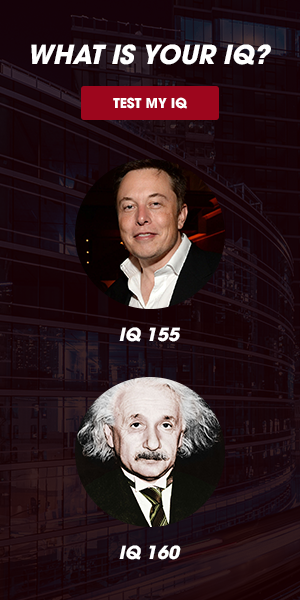ENTPs
The Inventor

What is ENTP?
ENTP stands for Extraversion, iNtuition, Thinking, and Perception and is one of 16 personality types studied from the MBTI personality identification indicator (Myers-Briggs Type Indicator). The MBTI personality assessment developed by Isabel Briggs Myers, Katharine Cook Briggs and David Keirsey from the work of renowned psychiatrist Carl G. Jung the types of psychology based on theories of cognitive functions. Keirsey named ENTP The Field Marshal because they are very passionate about coming up with new ideas. ENTP is one of four personality types of The Rational.
What are the personality traits of the ENTP group?
The MBTI assessment accurately estimates about 75% according to its guiding indicator, using multiple-choice questions on the basis of four "binary" (opposing psychological pairs), ENTP is one of 16 personality types and is abbreviated by the first four letters (iNtuition is an exception because I is used for Introversion) as follows:
-
Extraversion: extroverted tendencies, have the feeling of being motivated and energetic for those around them;
-
iNtuition: listen more to their intuition than specific feelings, so they focus their attention on the big picture rather than the little details, as well as things that might happen in the future rather than paying attention to reality;
-
Thinking: they think more rationally than emotionally, tend to value objective criteria rather than personal preferences. When making a decision, they usually based on logic rather than social factors;
-
Perception: they do not rush to evaluate or soon make an important judgment, instead, they always see the problem in a flexible way and can change depending on the specific situation.
What are the core values, actions, and thoughts of ENTP's personality trends?
ENTPs are described as intelligent, smart, outgoing, creative, flexible and resourceful. They are always excellent at coming up with new and unique solutions to difficult problems, usually, they do not plan ahead for a project. ENTPs also have a deep understanding of how things and relationships work and how to improve them. They do not like to be judgmental but open-minded and skillful in communicating with clever minds and flexible language skills. With relentless creativity and excellent social skills, The Inventor perfectly deserves the role of a leader in an organization or group.
One of the reasons why ENTPs can stand their ground firmly in nearly every debate is due to their knowledge and ability to think of other ideas so quickly, making unique connections. They do this at a very fast pace without putting too much effort - the arguments of ENTPs make their opponents easily confused. This can be either good or bad, depending on who they are arguing with - they can easily wipe out their opponent's argument in a political debate, but cause tremendous tension in a relationship if they try to do it with their partner.
ENTPs need to be careful to keep their argumentative debate under control, as actual progress is often more important than the truth. People with this type of personality know this very well, but they also need to understand that what they consider to be pleasure can hurt others.
ENTPs tend to use their intelligence in a very specific way and this is especially noticeable in a professional environment - they like to brainstorm and outline all options, but they try to avoid participating in the actual implementation. Once again, such a trait can be very valuable in certain situations, but causing workplace stress, ENTP can be considered a person with many ideas, but not willing to work hard to implement their ideas. ENTPs also tend to be rebellious, preferring to challenge existing regulations and procedures. These things cannot change them; instead, they want to delete the existing model and move on to the new one.
ENTPs often like to work with complex ideas and difficult challenges. They like big thoughts and do it well - this strong personality will be developed and once they do, the flow of ideas will constantly overflowing. However, ENTPs will still need to rely on assistance from others to organize and perform.
The ENTPs are very straightforward and honest. They do not care about being perceived as sensitive or compassionate, so their frankness is sometimes quite cruel. They say what they think without beating around the bush, they don't like people who talk indirectly, especially when asking ENTPs to do something. Therefore, ENTPs are often respected, but not necessarily favored. Society tends to value emotion, sensitivity, and comfort over unpleasant truths - this can make many ENTPs encounter obstacles and failures.
In general, people with the ENTP personality type are very rational and they do not perceive much emotional value. As a result, they are great when it comes to logical thinking, but are likely to have difficulty understanding emotions - ENTP's confidence and humor are often very appealing, but they can easily (and often inadvertently) hurt an individual belonging to a different personality type. Type F is particularly vulnerable in such situations when they dislike criticism and argument while ENTP thrives on this.
The career of the ENTP personality group
ENTP is the most versatile personality type, their list of occupations is extensive. ENTPs have the skills to turn the situation around quickly and strongly, giving them a distinct advantage on the career ladder - as long as they understand their strengths and weaknesses. ENTP likes to improve their knowledge with smart colleagues. They are suitable for the following career fields:
-
Business and leadership (Business management, Human resource management, Executives);
-
Art and Design (Architects, Art producers);
-
Science and Technology (Scientists, Engineers, Professors).
The relationship between ENTPs and others
ENTPs are active and agile communicators. They like to make connections and discover the information they receive from the people around them. ENTPs like to discuss creative solutions, unique ideas, and has the patience to explain them in detail to everyone:
-
For INTP, ENTJ, ENFP: they have similar characteristics and many things in common so it is easy for ENTPs to share values, interests, and approaches;
-
For INTJ, INFP, ESTP, ENFJ: they have some differences but these differences are attractive to ENTPs. Basically, they still have something in common to create a balance in their relationship with ENTPs;
-
For INFJ, ISTP, ESTJ, ESFP: At first, ENTPs may have some difficulty accessing and connecting with this personality group. However, if interacting for a while, they will discover commonalities as well as other points of view that can complement each other;
-
For ESFJ, ISFJ, ISTJ, ISFP: this personality group is opposite and conflicting with ENTPs, but if it is possible to develop a relationship, this is an opportunity for ENTPs to learn and grow themselves, the challenges always come with great opportunity.
No one can be as smart and logical as ENTPs. ENTPs really like to debate and they can spend the whole night defending an opinion, even though they don't believe that opinion is right. If ENTP's friends can hold their views and make reasonable values and arguments, then the ENTPs will consider it.
ENTP's friends cannot realize the sensitivity and affection of ENTPs, even though they were very intuitive. People with the ENTP type of personality are often known as rational and emotionless people - they can be quite funny and enthusiastic, but not a spiritual support for those who are sad. They will certainly come up with perfectly logical solutions, but emotions and affections are what ENTP wants to refute.
In general, ENTPs have no trouble communicating with friends and people of other personality groups, especially if they are not afraid to suggest and discuss new ideas and interesting things (ENTPs should be sure that this does not become a competition or quarrel). However, when not in the same position as the person who argues, ENTPs rarely give much time to put themselves in their shoes.
In short, ENTPs are natural, relaxed and optimistic people who can make people happy. ENTPs receive a lot of joy and satisfaction from influencing others, especially in debating the hypotheses and concepts that interest them. ENTPs also tend to initiate debate because they love to argue. They are usually cheerful and social, as well as very attractive. They have problems with distraction at work and sometimes neglect close relationships when having to participate in a project or a new idea.
Classify trends in the ENTP personality group
-
Artisan personality groups (SP): ISFP (Composer), ISTP (Crafter), ESFP (Performer), ESTP (Promoter);
-
Guardian personality group (SJ): ISTJ (Inspector), ISFJ (Protector), ESFJ (Provider), ESTJ (Supervisor);
-
Idealist personality group (NF): ENFP (Champion), INFJ (Counselor), INFP (Healer), ENFJ (Teacher);
-
Rational personality group (NT): INTP (Architect), ENTJ (Field Marshal), ENTP (Inventor), INTJ (Mastermind).
The popularity of the ENTP personality group
This is the rarest personality group in the world and accounts for about 2-5% of the world's population. By gender, only 2% of ENTPs are female and 4% are male. ENTPs love to argue, they don't care what they're arguing about as long as it's interesting. They may not really support the idea they are arguing about but may decide to go against the prevailing view, they see this as a mental exercise. ENTPs are very quick and unique, giving them a big advantage in debate, academics, and politics - however, they also tend to do very well in many other areas that require the readiness to challenge existing ideas and organize lots of arguments.
The famous ENTPs
-
Alexander the Great;
-
Theodore Roosevelt - President of the United States;
-
Benjamin Franklin - Inventor, and Politician;
-
Richard Feynman - Physicist;
-
Voltaire - Philosopher, Adviser to Frederick the Great;
-
Catherine the Great - Queen of Russia;
-
Niccolo Machiavelli - Philosopher and Historian, Author of "The Prince";
-
Steve Wozniak - Co-Founder of Apple with Steve Jobs;
-
Karl Popper - Philosopher;
-
Thomas Edison - Inventor of genius.



